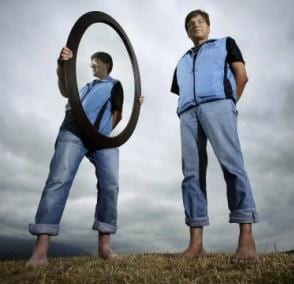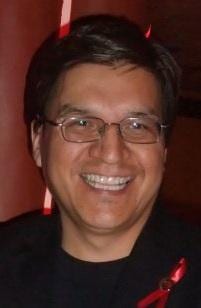
"You can either sit back and let the world rush by or you can choose to be part of it," Dolan Badger once wrote in an artist's statement. Credit: Facebook.com
Jan 14, 12:15pm
Whitecourt, Alberta, RCMP say a 22-year-old Morinville, Alberta, man has been charged with second-degree murder in connection with the Jan 12 death of Dolan Badger, 49.
But, says RCMP Staff Sergeant Rodney Koscielny, the case is not being considered a hate crime as family and friends had earlier believed.
“Hate was not involved. It was not a gaybashing,” Koscielny says. “It was a fight that went wrong.”
He says the fact that there was a fight between the men who knew each other rules out calling the case a gaybashing.
Police were called to a Whitecourt residence at 7:30am on Sat, Jan 12 after reports of a disturbance, Koscielny tells Xtra.
“A fight broke out in the residence,” Koscielny says.
The attending officer found a badly injured man at the scene. CPR was administered and Badger was rushed to hospital where he died, Koscielny says.
William Kootenay was arrested at the scene and subsequently charged with one count of second-degree murder.
There is no indication of premeditation, Koscielny says. “It appears it is not the case as we know it at this time.”
The cause of death was expected to be determined in a Jan 14 autopsy, he says.
Kootenay is due to make his first appearance in Whitecourt Provincial Court Jan 22.
***
Jan 12
A gay outreach worker who was killed Jan 12 in what is being called a gaybashing is being remembered as a gentle soul.
Dolan Badger, who lived for years in Vancouver, was working as a support and outreach worker with HIV Network of Edmonton, according to his LinkedIn page.
Earl Sunshine tells Xtra that his cousin was killed in Whitecourt, Alberta, northwest of Edmonton. He says he was told by Badger’s sister.
“They said that he was gaybashed about 8am in the morning,” says Sunshine, incoming president of the Greater Vancouver Native Cultural Society, a gay aboriginal group.
The RCMP has not issued any release on a death. The local detachment could not be reached for confirmation or comment.
According to Badger’s Facebook page, on Jan 8 he was looking for a ride from Whitecourt to Valleyview, further northwest of Edmonton.
Badger was from the Sturgeon Lake Cree reserve in northern Alberta. He moved away from his reserve when he started school, later going to university.
“Growing up, I didn’t feel proud of my Native heritage,” he wrote in Edmonton’s vueweekly.com in April 2009. “Whenever we made trips to the reserve the other children would make fun of us and call us ‘white Indians,’ and when we returned to our little community we were always reminded that we were ‘dirty Indians.’ It was a difficult situation to be in.”
In 1993, Badger was hired as a street liaison worker/educator for Vancouver’s aboriginal AIDS group, Healing Our Spirit.
It was while working in the HIV/AIDS field that Badger came across the term two-spirit. “Growing up as both gay and aboriginal was difficult. I felt that I had to stay away from the two aspects of my life that defined me because I was constantly bombarded with slurs, racist insults and derogatory remarks,” he wrote. “Largely because of my work with Healing Our Spirit and my discovery of the term, I now stand proud as a two-spirit person and as an aboriginal, and no longer do I need to blend into the background.”
Badger also worked as an outreach worker with the Urban Native Youth Association, where he helped organize Embracing Our Spirits events.
In 2006, Badger told Xtra that many two-spirit people face not only homophobia, but have to endure racism and isolation as well. As a result, he said, “many people give up their traditions when they move to the big city.”
Neil Fernyhough, of BC’s Radical Faeries, says he met Badger at the first Radical Faerie Camp in 2011. “He really was a sweet, gentle soul, very soft-spoken,” Fernyhough says. “He was awestruck by the Faeries. As someone who found it so challenging to even be out in his home community of Whitecourt, he found our embrace and celebration of big homo, fey faggotry absolutely astounding.”
Before returning to Edmonton, Badger also worked with youth organizations in Victoria, where he lived with friend and Coast Salish artist Rose Spahan.
“We loved him so much. He was a fabulous man,” she tells Xtra. “He worked hard, and he believed in the solidarity of aboriginal people. He loved his family and his friends.
“He was a gentle soul. Who would do this to him? I think it might have been a gaybashing for sure,” she says.
Badger lived with Spahan from the spring to fall of 2012. When his mother became ill, he moved home to the reserve near Whitecourt.
“When his mom died, he didn’t come back; he stayed on the reserve,” Sunshine says.
Duane Ghastant Aucoin, an award-winning two-spirit Teslin-Tlingit filmmaker, is one of the people Badger helped on his journey to accepting himself.
“He was somebody who gave to the community,” Aucoin tells Xtra, his voice faltering with emotion. “He was such a sweet person, one of those safe people to be around. I’m just numb. I’ve never known anyone before who’s been murdered.”
Badger helped Aucoin find people to be involved in his multimedia film, Kichx Anagaat Yatx’i: Children of the Rainbow, which won the Audience Favourite award at Vancouver’s 2003 Queer Film Festival.
John Powell, an artist, designer and member of the Mamalilikulla tribe of BC’s Kwakwaka’wakw First Nation, did a two-person art show with Badger in 2001 at the Indian Art Centre in Gatineau, Quebec, outside Ottawa. Badger had 12 pieces in the show, Powell says.
“Dolan was so fun. He had the most incredible smile,” Powell says. “He didn’t say a lot. If he did say something, you would burst out laughing.”
In his artist statement, Badger said experience had showed him it takes a lifetime to be an artist. “I feel that it’s important to open oneself up and to take a risk by exposing who I am as an artist and a person allowing viewers to share in personal feelings and ideas. Creative risk is the passion behind one’s art and sometimes that means revealing controversial subjects.
“My creative mood hits me in times of quiet solitude,” he said. “Life is a risk. You can either sit back and let the world rush by or you can choose to be part of it.
“If you do not take the chances, nothing happens,” Badger said. “For me as an artist, as a person, that is what life is all about.”

 Why you can trust Xtra
Why you can trust Xtra


